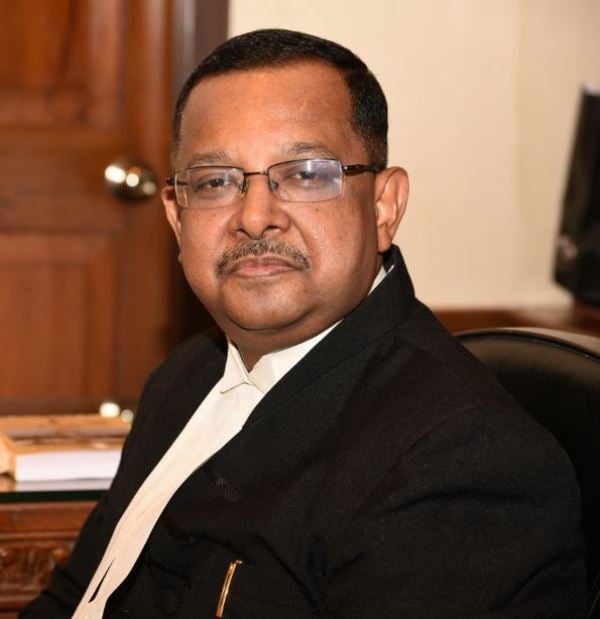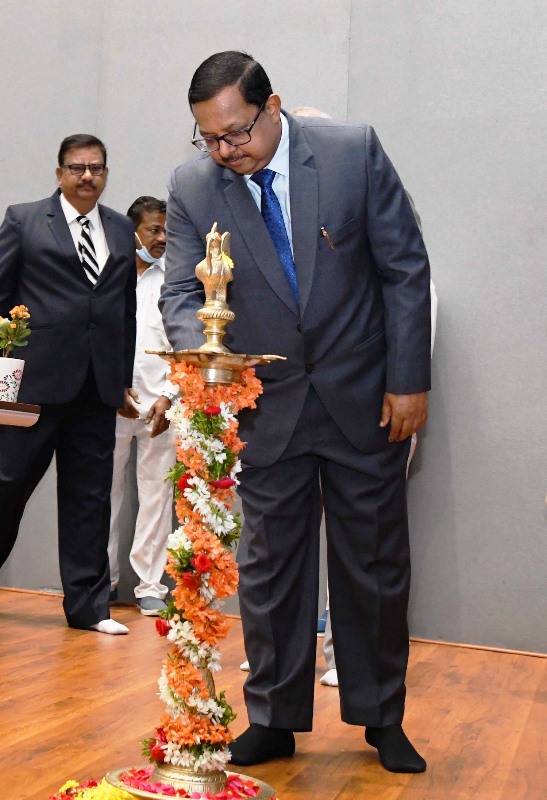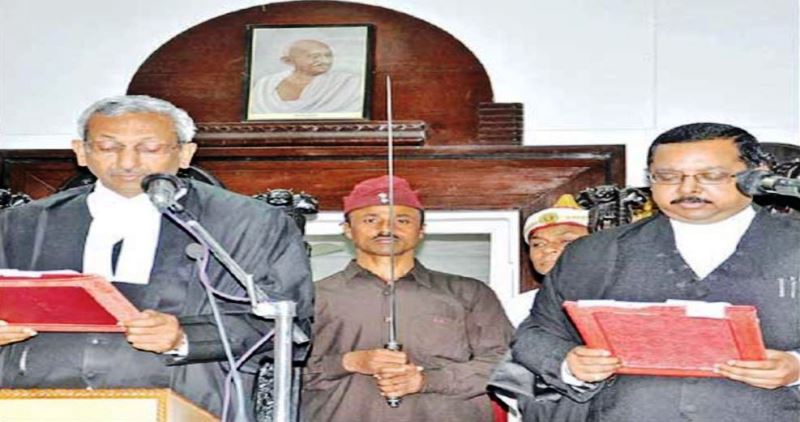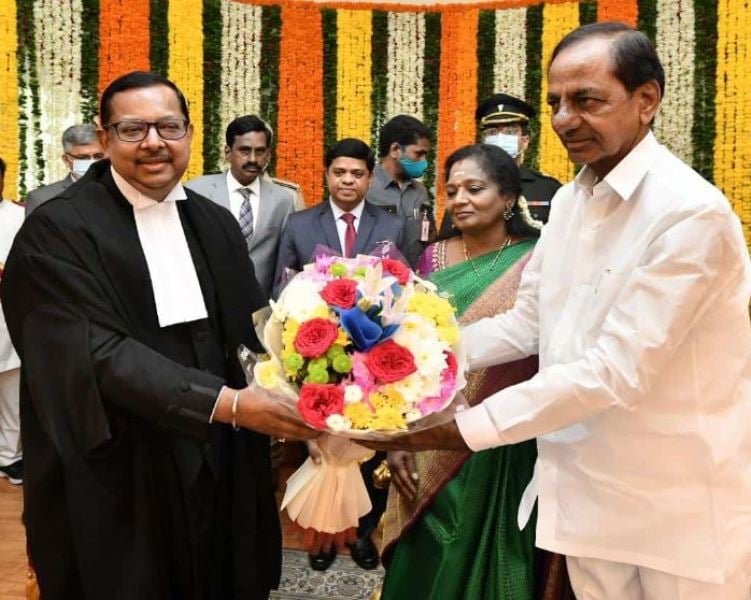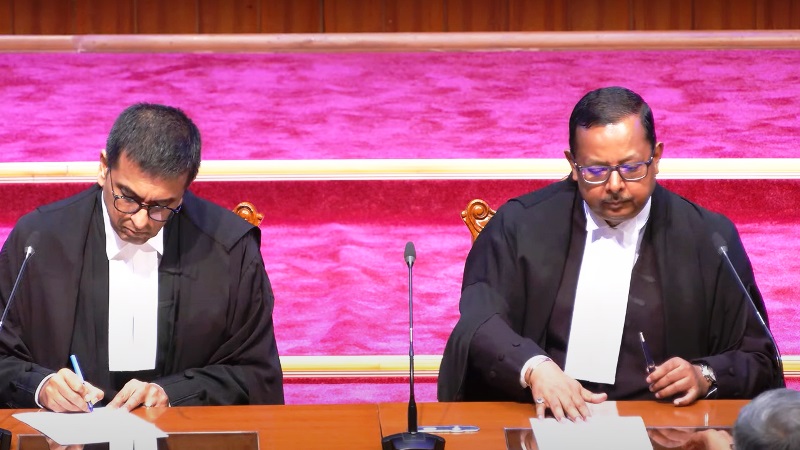Justice Ujjal Bhuyan Age, Wife, Family, Biography & More
Quick Info→
Hometown: New Delhi
Marital Status: Married
Age: 59 Years
| Bio/Wiki | |
|---|---|
| Profession | Judge of Supreme Court of India |
| Physical Stats & More | |
| Height (approx.) | in centimeters- 165 cm in meters- 1.65 m in feet & inches- 5’ 5” |
| Eye Colour | Black |
| Hair Colour | Black |
| Judicial Service | |
| Designation(s) | • Judge of Gauhati High Court (17 October 2011 – 2 October 2019) • Judge of Bombay High Court (3 October 2019 – 21 October 2021) • Judge of Telangana High Court (22 October 2021 – 27 June 2022) • Chief Justice of Telangana High Court (28 June 2022 – 13 July 2023) • Judge of Supreme Court of India (assumed office on 14 July 2023) |
| Notable Judgement(s) | • Striking Down The Telangana Eunuchs Act of 1919: In July 2023, in the case of V. Vasantha Mogli v. State of Telangana, a division bench comprising Chief Justice Ujjal Bhuyan and Justice CV Bhaskar Reddy declared the Telangana Eunuchs Act of 1919 unconstitutional. They cited that the Act was in violation of Articles 14, 15, and 21 of the Indian Constitution and infringed upon the rights of individuals belonging to the transgender community. According to the Act's definition, eunuchs were considered individuals of the male sex who either admitted to being impotent or appeared to be impotent upon medical examination. The Act, which originated in the Hyderabad Nizam's dominions, made it compulsory for all eunuchs to register with the authorities and authorized the arrest of transgender people without a warrant if they were "reasonably suspected" of committing offences like abducting or kidnapping boys or engaging in unnatural acts. The legal challenge against the Act was initiated in September 2018 when Vyjayanti Vasanta Mogli, a transgender activist known for her pioneering efforts in advocating for LGBTQI+ rights through public interest litigation in high courts and the Supreme Court of India, filed a petition. • Properties Attached in PMLA Probe Should Be Released After Acquittal: In the VANPIC Ports (P) Ltd. v. Directorate of Enforcement case, a division bench of the Telangana High Court, headed by Chief Justice Ujjal Bhuyan and Justice N. Tukaramji, made a significant ruling regarding properties seized under the Prevention of Money Laundering Act (PMLA). According to their ruling, if a case against the owners of the properties is closed, either due to acquittal or through a compromise settlement, the seized properties must be released. The case before the High Court involved Manturi Shashi Kumar and his wife Swapna, who had filed a petition to instruct the Enforcement Directorate to release their properties after the money laundering case against them had been closed. Initially, a single judge had denied their request, arguing that the case was settled in the Lok Adalat through a compromise rather than on its merits. The judge also noted that the couple had no legitimate income and had acquired the properties through the proceeds of money laundering activities. However, the division bench referred to the Supreme Court's ruling in the Vijay Madanlal Choudary case. The apex court had held that a final acquittal from a scheduled offence or criminal case by a competent authority implies that no offence had taken place. The division bench emphasized that the manner of acquittal, whether based on merit or through a compromise settlement, does not affect the decision. Therefore, based on the Supreme Court's precedent, the division bench of the Telangana High Court ruled in favour of Manturi Shashi Kumar and Swapna, stating that their properties should be released since the case against them had been closed, either through acquittal or compromise settlement. • Staying Abroad For Career Not “Cruelty to Husband” or “Desertion of Spouse”: In 2021, a division bench consisting of Justices Ujjal Bhuyan and P K Chavan at the Bombay High Court refused to interfere in the dismissal of a husband's divorce petition by a family court in Bandra. The family court had ruled that the husband had failed to provide any evidence of cruelty or desertion against his wife, who is an overseas citizen of Canada. Both the husband and wife held dual citizenship in India and Canada, but eventually, the husband started living in Mumbai, while their minor son kept on living with his mother in Canada. The couple married in Mumbai in 2004. In 2016, the husband sought a divorce on the grounds of "willful desertion" by his wife. He alleged that during his visit to Canada in 2013, he was not warmly received, and in 2015, he faced "mental cruelty." Consequently, he filed for divorce, claiming cruelty through desertion. The High Court observed that the wife's desire to settle in Canada was driven by the fact that the husband had initially made a conscious decision to settle abroad. The court opined that the wife's wish to settle in Canada should not be considered selfish or unjustified since both of them had mutually decided to move to Canada permanently for better prospects. Upon examination, the High Court found the husband's evidence to be unclear and insufficient. The court concluded that there was no basis to assert that the wife had treated him with cruelty by deserting him and upheld the family court's decision to dismiss the husband's divorce petition. • No Coercive Steps Against Schools, Parents Over Online Classes Up To Standard II: In 2020, a bench comprising Justices Ujjal Bhuyan and N R Borkar at the Bombay High Court issued a directive to the state government, urging them not to take any forceful actions against schools that were conducting online classes for students up to standard II, as long as the students and parents were willing to participate in such virtual teaching. The court's instruction came after a petition was filed by the Parents Teachers Association of United Forum and two parents who challenged the state's circular, which prohibited online classes for students from pre-primary to standard II. • Quashing an FIR against Republic TV’s Editor-in-Chief Arnab Goswami: In 2020, a division bench comprising Justices Ujjal Bhuyan and Riyaz Chagla at the Bombay High Court provided interim relief to Arnab Goswami, the anchor and Chief Editor of Republic TV. The court suspended the two First Information Reports (FIRs) filed by the Mumbai police against him. The FIRs were related to his alleged provocative and inflammatory comments concerning the Palghar lynching incident and the gathering of migrant workers at Bandra railway station. Goswami had been charged under several sections of the Indian Penal Code for purportedly making communal comments on his television show. Bhuyan and Chagla while responding to the writ petition filed by Goswami to quash the two FIRs, said, "Seventy years into our republic we cannot be seen to be skating on thin ice so much so that mere mention of a place of worship will lead to animosity or hatred amongst religious communities causing upheaval and conflagration on the streets. Subscribing to such a view would stifle all legitimate discussions and debates in the public domain.” • Appointing Wife As Guardian To Her Husband Lying In Coma:In 2020, a panel of judges consisting of Justice Ujjal Bhuyan and Justice Milind N Jadhav ruled that even though there was no specific law governing the appointment of guardians for patients in coma, the wife could be deemed "most suitable" to assume the role, given that Hindu Vedic philosophy considers marriage as a lifelong union of two souls. This decision was made during the hearing of the Rajni Hariom Sharma v. Union of India case. In the case, a woman sought to be appointed as a guardian for her 42-year-old husband, who had fallen into a coma after suffering a cardiac arrest while jogging. The woman argued that her husband's medical condition rendered him unable to use his intellect, communicate, or sign important documents. Therefore, she believed it was necessary for her to act as his guardian in order to safeguard his business and other interests. She had made requests to banks to permit her to sign cheques on behalf of her husband, but her requests were denied. • Branding Women as Witch and Then Resoting to Witch-hunting is Human Rights Violation: In the Bhim Turi v. State of Assam case, in 2017, a division bench of Justices Ujjal Bhuyan and Paran Kumar Phukan, JJ. observed that branding a man or a woman as a witch and then resorting to witch-hunting was a dehumanizing act and was in violation of human rights. In the case, the appellant had appealed against the judgment of the Sessions Court which sentenced them to imprisonment for life as the accused persons had murdered the victims suspecting them to be witches. |
| Personal Life | |
| Date of Birth | 2 August 1964 (Sunday) |
| Age (as of 2022) | 59 Years |
| Birthplace | Guwahati, Assam |
| Nationality | Indian |
| Hometown | New Delhi |
| School | Don Bosco High School, Guwahati |
| College/University | • Cotton University (formerly known as Cotton College), Guwahati • Kirori Mal College, Delhi • Bishnu Ram Medhi Government Law College, Guwahati • Gauhati University, Guwahati |
| Educational Qualification | • A bachelor’s degree in Arts Kirori Mal College, Delhi • LLB at Bishnu Ram Medhi Government Law College, Guwahati • LLM at Gauhati University, Guwahati [1]ETV Bharat [2]High Court for the State of Telangana |
| Religion | Hinduism [3]ABP Telugu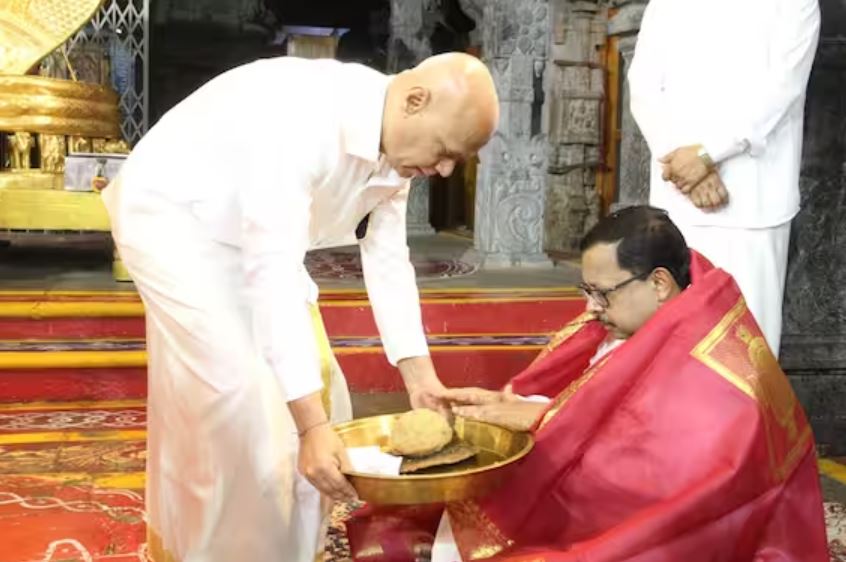 |
| Relationships & More | |
| Marital Status | Married |
| Family | |
| Wife/Spouse | Name Not Known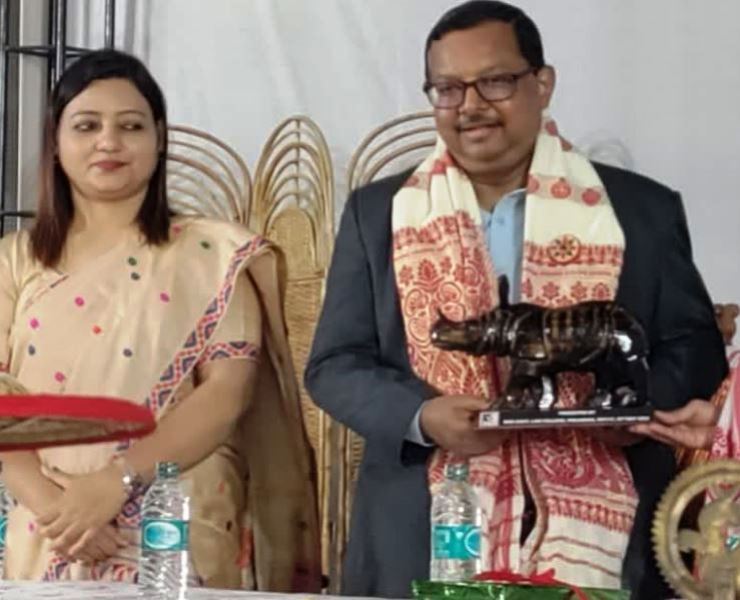 |
| Children | He has a daughter.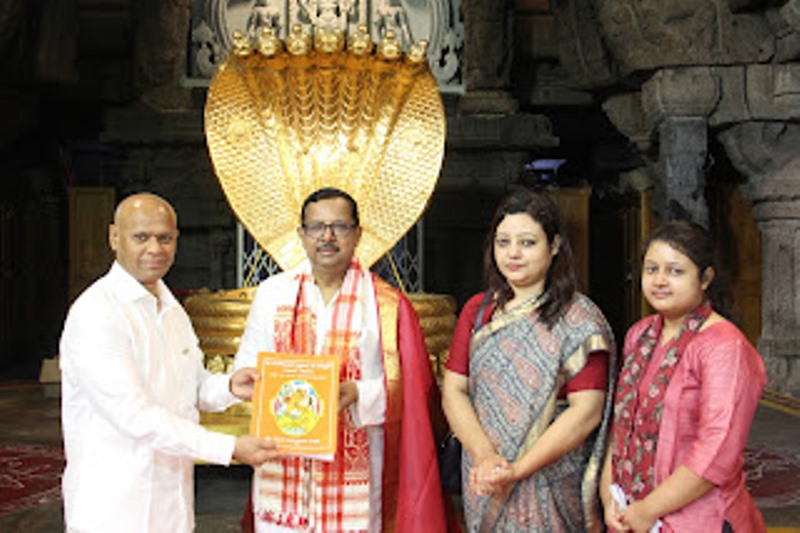 |
| Parents | Father- Suchendra Nath Bhuyan (deceased; served as Advocate General of Assam)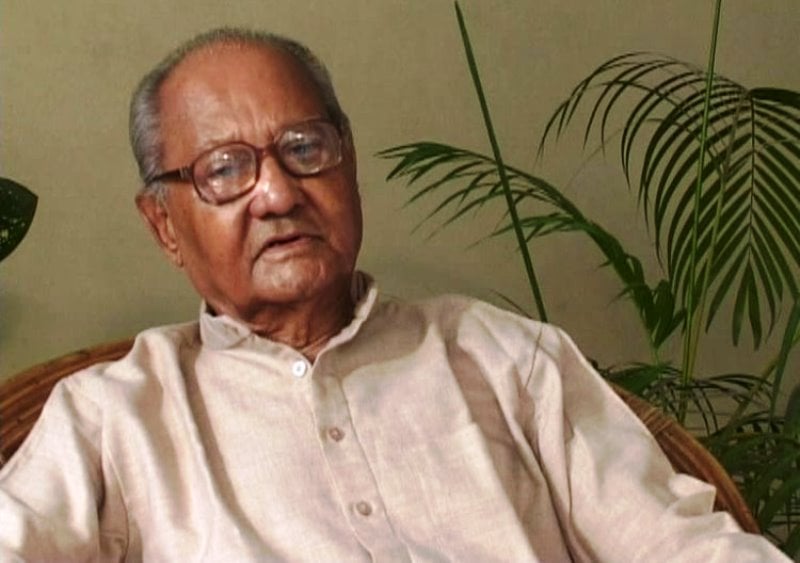 Mother- Subhadra Saikia 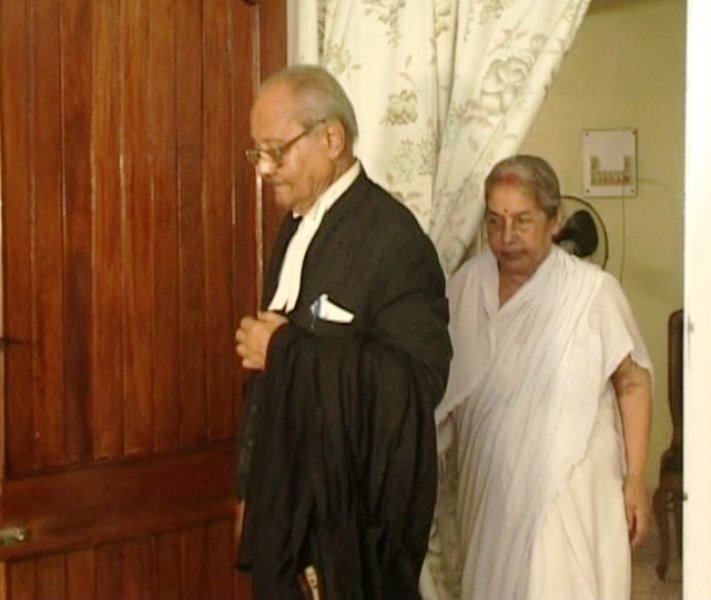 |
| Siblings | Brother- None Sister(s)- Shagata, Anulekha, Jyoti |
Some Lesser Known Facts About Justice Ujjal Bhuyan
- Ujjal Bhuyan is a Judge of Supreme Court of India. He has served as the Judge of Gauhati High Court (2011-2019), Judge of Bombay High Court (2019-2021), Judge of Telangana High Court (2021-2022), and Chief Justice of Telangana High Court (2022-2023).
- Ujjal Bhuyan’s father, Suchendra Nath Bhuyan, was a freedom fighter and actively participated in the Quit India Movement. However, Suchendra Nath later developed an interest in leftist ideology and became involved in the Left movement. In the early 1950s, he became a dedicated activist of the Communist Party of India (CPI). However, due to the authorities’ ban on CPI, Suchendra Nath was arrested and imprisoned for his involvement in the party’s activities. Besides being a political activist, Suchendra Nath was also a devoted philanthropist. He tirelessly worked for the upliftment of the underprivileged and generously contributed to the establishment of various institutions, including educational ones in Kampur and Guwahati. In 2006, a 52-minute documentary titled “Kopilir Polos Suchendra Nath Bhuyan” was scripted and directed by Dip Bhuyan, showcasing his life and contributions.
- Justice Bhuyan was enrolled as a lawyer with the Bar Council of Assam, Nagaland, Meghalaya, Manipur, Tripura, Mizoram, and Arunachal Pradesh on 20th March 1991.
- He practised law at the Principal Seat of the Gauhati High Court in Guwahati and appeared before its Benches in Agartala, Shillong, Kohima, and Itanagar. His legal expertise extended to various other forums, including the Central Administrative Tribunal in Guwahati, the Assam Board of Revenue, the Labour Court in Guwahati, various Civil Courts, and the State Consumer Forum in Arunachal Pradesh.
- Throughout his career, Ujjal Bhuyan held several significant positions. He had a 16-long-association with the Income Tax Department, starting as the Standing Counsel and later becoming the Senior Standing Counsel of the Income Tax Department.
- From April 2002 to October 2006, he served as the Additional Government Advocate of Meghalaya in the Principal Seat of the Gauhati High Court.
- Subsequently, he was the Special Counsel of the Forest Department, Government of Arunachal Pradesh, from December 2005 to April 2009, and the Standing Counsel of the Gauhati High Court.
- Recognizing his exceptional legal acumen, the Gauhati High Court designated him as a Senior Advocate on 6th September 2010.
- Further, he was appointed as the Additional Advocate General of Assam on 21 July 2011.
- He was a member of the Gauhati High Court Bar Association, Lawyers Association in Guwahati, Bar Association of India, All India Federation of Tax Practitioners, and Indian Law Institute, Assam Chapter. Additionally, he maintained close associations with the Judicial Academy, Assam, and the National Law University, Guwahati.
- He was elevated as an Additional Judge of the Gauhati High Court on 17 October 2011 and was confirmed in this capacity on 20 March 2013.
- He has served as the Executive Chairman of the Mizoram State Legal Services Authority. He had close associations with the Judicial Academy, Assam, and the National Law University, Guwahati.
- After a two-year stint at Bombay High Court, he was transferred to Telangana High Court. During his tenure at the Telangana High Court, he was the Executive Chairman of the Telangana State Legal Services Authority.
- On 14 July 2023, Justices Ujjal Bhuyan and SV Bhatti, who was serving as Chief Justice of Kerala High Court, were elevated as Supreme Court judges.
References/Sources:

